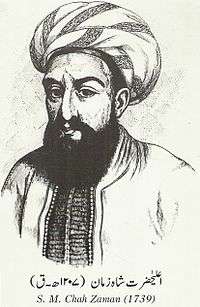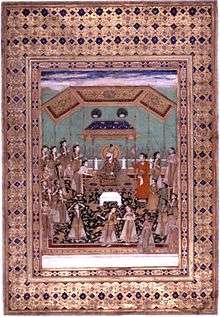Zaman Shah Durrani
| Shah Zaman Durrani زماں شاہ درانی | |||||
|---|---|---|---|---|---|
| Ruler of the Durrani Empire | |||||
 | |||||
| 3rd Durrani ruler | |||||
| Reign | 18 May 1793 – 25 July 1801 | ||||
| Coronation | 1793 | ||||
| Predecessor | Timur Shah Durrani | ||||
| Successor | Mahmud Shah Durrani | ||||
| Born | 1770 | ||||
| Died | 1844 (aged 74) | ||||
| Burial |
1844 Ahmad al-Fārūqī al-Sirhindī in Sirhind, Punjab | ||||
| |||||
| Dynasty | Durrani | ||||
| Father | Timur Shah Durrani | ||||
| Religion | Islam | ||||
Shah Zaman Durrani, (Pashto, Persian, Urdu, Arabic: زماں شاہ درانی), (c. 1770 – 1844) was ruler of the Durrani Empire from 1793 until 1800. He was the grandson of Ahmad Shah Durrani and the fifth son of Timur Shah Durrani. An ethnic Pashtun like the rest of his family and Durrani rulers, Shah Zaman became the third King of Afghanistan.
Early Years

He seized the throne of the Durrani Empire on the death of his father, Timur Shah. He defeated his rivals, his brothers, with the help of Sardar Payenda Khan, chief of the Barakzais. He extracted an oath of allegiance from the final challenger, Mahmud, and in return relinquished the governorship of Herat. In so doing, he divided the power base between Herat and his own government in Kabul, a division which was to remain in place for a century. Kabul was the primary base of power, while Herat maintained a state of quasi-independence. Kandahar was fought over for the spoils.
During his reign he tried to combine his dispersed relatives together who were deported by his father Timur Shah. His uncle Saifullah Khan Durrani, his sons Mohammad Umar, Bashir Ahmad Khan and Shams Ur Rehman, his cousins Faizullah Khan and Abdullah Khan lived in Akora Khattak in present-day Khyber Pakhtunkhwa. They were contacted to come back to Afghanistan but without success. Saifullah Khan died in 1779 and after that the family was led by Faizullah Khan but he disliked the bad habits of Abdullah Khan and Bashir Ahmad Khan and left Akora Khattak and went to Bannu without informing his relatives. Later on, after the death of his wife, Abdullah Khan Durrani migrated to Kohat in 1791 where he married a widow, Pashmina.
Shah Zaman tried his best to recombine his family members and relatives so as to gain power but many of them were living an unknown life. Some of them have even been forgotten their identity.
He attempted to repeat his father's success in India, but his attempts at expansion attempts were failed by the Sikhs and also brought him into conflict with the British. The British induced the Shah of Persia to invade Durrani, thwarting his plans by forcing him to protect his own lands.
In his own lands things went well for Zaman, at least initially. He was able to force Mahmud from Herat and into a Persian exile. However, Mahmud established an alliance with Fateh Khan, with whose support he was able to strike back in 1800, and Zaman had to flee toward Peshawar. But he never made it; on the way, he was captured, blinded and imprisoned in Kabul, in the Bala Hissar.
Later Years
Zaman Shah was rescued when his brother Shujah Shah Durrani became the king after toppling Mahmud Shah Durrani in 1803. He lived in 'blinded' luxury up to 1809 when Mahmud Shah Durrani again seized the throne. While his brother, Shujah Shah was captured by the Governor of Attock, he managed to escape with the zenana (ladies of the house) of his brother and his own to Lahore and sought asylum from Maharaja Ranjit Singh in 1810. This was the same Sikh Emperor, whose lands he had invaded only a decade earlier. Ranjit Singh was magnanimous. He first allowed Zaman Shah to stay at Rawalpindi and, in 1811, received him with full state honours at Lahore. After a few years, Zaman Shah moved to Ludhiana where he lived with a pension of Rs 24,000 from the British. Zaman Shah never went back to Afghanistan when his brother, Shujah Shah Durrani, was reinstated with the help of the British and the Sikhs under Ranjit Singh. He died at Ludhiana in 1844.[1]
He is buried at the mazar of Ahmad al-Fārūqī al-Sirhindī in Sirhind, Punjab (India).[1]
References
- 1 2 Newslaundry. "Newslaundry - Sabki Dhulai".
Further reading
- Dalrymple, William (2013). Return of a King. Bloomsbury. ISBN 978-1-4088-3159-5.
External links
| Wikimedia Commons has media related to Zaman Shah Durrani. |
- The British Library – Chronology: from the emergence of the Afghan Kingdom to the Mission of Mountstuart Elphistone, 1747–1809
- Encyclopædia Britannica – Zaman Shah (1793–1800)
- Zaman Shah Durrani's invasion of India and Tipu Sultan (1793–1800)
| Regnal titles | ||
|---|---|---|
| Preceded by Timur Shah Durrani |
Emir of Afghanistan 18 May 1793 – 25 July 1801 |
Succeeded by Mahmud Shah Durrani |
.jpg)